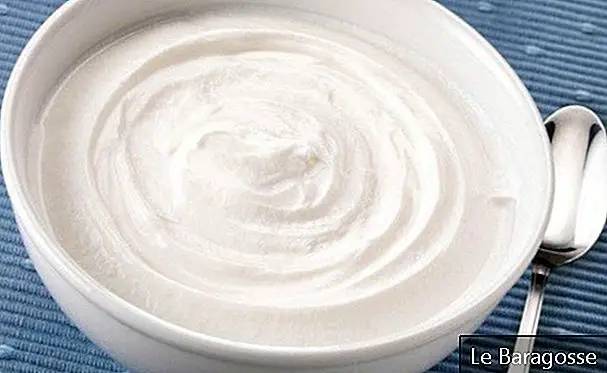
When you think of Greek yogurt, what comes to your mind? A healthy food? A calorie snack alternative? A good choice for protein consumption? The controversy surrounding Greek yogurt is big. And with good reason. The fact is that not all options available on the market are healthy and nutritious. Recipes vary by brand, which means that protein, sugar and added ingredients can have significant changes.
What is Greek yogurt?
Traditionally, Greek yogurt is made by removing whey (the liquid remaining after the buttermilk). The end result is a more solid yogurt with less sugar, less carbohydrates, and more protein compared to regular yogurt. According to nutritionist Tatiana Hirooka, Greek yogurt is considered an intermediate product between traditional fermented milks and high-ripened unripened cheeses such as boursin, quark or petit suisse.
How is it made?
Manufacturing varies by manufacturer. It may be by an industrial process that removes part of the whey from the product, or by the addition of ingredients such as milk proteins, sour cream or natural thickening gums. As a result we have a thicker and creamier yogurt with a higher concentration of total solids, protein and fat.
Greek yogurt versus regular yogurt
According to Tatiana explains, the main difference between Greek and traditional yogurt is in the firmer and creamier texture that plays a fundamental role in the quality of the final product. The amount of protein, fat, sodium, calcium, sugar and lactose will greatly depend on the manufacturing process of the product.
Another difference between Greek yogurt and regular yogurt is the removal of whey (the watery part of milk that remains when the milk is curdled). When whey is removed there is a lower amount of sugar, carbohydrates and protein compared to regular yogurt.
Check out some of the most common myths about Greek yogurt and see tips for choosing the best option for consumption.
MYTH 1: All Greek yogurt is made the same way.
Greek yogurt achieves its creamy consistency and increased protein during the deformation process. However, some marks skip deformation and add thickening agents (modified cornstarch, carrageenan, or guar gum) as well as protein enhancing ingredients (concentrated milk protein or whey) to mimic the rich texture and the high protein content.
There are no clear rules of what may or may not be considered Greek yogurt. Because producing Greek yogurt requires some expensive and time-consuming equipment and processes, some companies do not produce food in the traditional way and add ingredients or alter the process of how yogurt is made. As there is no regulation, the name is Greek? has been added without criteria.
Nutritionist Tatiana Hirooka explains that in Europe and the United States Greek yogurt goes through various filtration processes, resulting in more protein and less fat. In Brazil, the main objective is to be careful about the texture:? To this, ingredients such as sour cream, whole milk, sugar and gelatin are added resulting in a highly caloric product? affirms.
MYTH 2: Greek Yogurt is a High Protein Food
Product advertising often states that Greek yogurt contains twice as much protein as when purchased from regular yogurt (pulp). Again this statement is a myth because not all Greek yogurts contain such a significant amount of protein. They do contain a higher amount of protein, but not necessarily double. The yogurt manufacturing process is determinant for quantity.
MYTH 3: Greek Yogurt is a Vegetarian Option
This rule is not valid for all brands! Some options are added gelatin, for example, which comes from collagen obtained from various animal by-products. This is not a problem for people who eat meat, but it can be for lacto vegetarians who eat milk, cheese and yogurt.
In addition, some brands use a substance called carmine, a natural dye derived from the beetle's body that gives the yogurt a strawberry flavor and a pink hue.
MYTH 4: Flavored Greek Yogurt is as Healthy as Natural Greek Yogurt
Your first choice should always be plain Greek yogurt. If you want to sweeten it slightly, opt for fresh fruit pieces or a drizzle of honey. That's because flavored Greek yogurt tends to contain a high sugar content, around 15 to 25 grams per serving.
MYTH 5: Frozen Can Be Considered a Greek Yogurt
Frozen and Greek yogurt are not the same thing. Although they have the same number of calories and fat per serving, frozen typically contains more sugar and much less protein than traditional Greek yogurt.
How to get it right

To ensure that you are eating a real Greek yogurt it is important to read the product label. The main ingredients should be milk and probiotics. Items such as whey, thickeners, modified cornstarch, sour cream and gelatin should be completely avoided. Tatiana guides:? There are many differences between brands, especially regarding protein content, saturated fat, sodium, calories and calcium per serving.
Remember that yogurt should be part of daily food, because according to Tatiana, is a source of protein, calcium, phosphorus, vitamins and carbohydrates. This food can bring benefits to the body: facilitates the digestion of proteins; improves absorption of calcium, phosphorus and vitamin D; assists in maintaining the intestinal flora; It has 20 to 30% less lactose than traditional milk and is well tolerated by mild lactose intolerants. But care must be taken with the ingredients of the composition. Some have excess fats and unhealthy ingredients: such as sour cream, cornstarch and whey.
Below is the Nutrition Chart of three types of yogurt? greek yogurt, plain yogurt (pulp), light greek yogurt? to compare the ingredients, amount of carbs and fat of each type and choose your option. For those with an eye on the balance, light is still the best choice.
Greek yogurt
- 100g of greek yogurt
- Carbohydrates? 15 g
- Proteins? 4.6g
- Total fat ? 4g
- Saturated fat ? 2.3g
- Sodium? 75mg
- Calories? 113 kcal
Plain yogurt? pulp
- 100g of pulp yogurt
- Carbohydrates? 17g
- Proteins? 2.9g
- Total fat ? 2.4g
- Saturated fat ? 1.6g
- Sodium? 36mg
- Calories? 95 kcal
Light greek yogurt
Greek Yogurt Nutrition Explained (March 2024)
- food
- 1,230
















